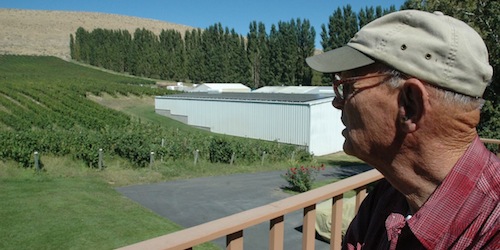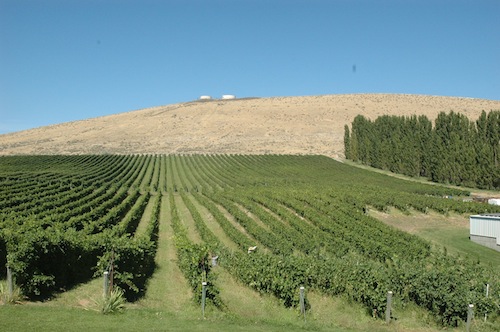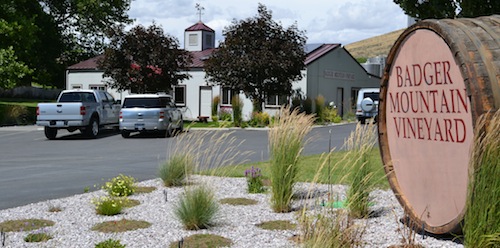
KENNEWICK, Wash. – Bill Powers, a longtime grape grower, winery owner and innovator, died Tuesday after a brief illness.
He was 88.
His son, winemaker Greg Powers, said his father was in the hospital for seven days, suffering from congestive heart failure and kidney failure.
“He was fading,” Powers told Great Northwest Wine. “He wanted to come home, so we brought him home Friday. On Saturday, he was able to sit on the deck and see and enjoy his vineyard.”
He died at 5 a.m. Tuesday.
“He left a huge footprint on the whole industry,” his son said.
Badger Mountain Vineyard turns organic

Powers began growing wine grapes in 1982 on Badger Mountain, a hill not far from Red Mountain. By the mid-1980s, Powers decided he wanted to begin farming organically after he became concerned about what chemicals might do to his farming friends, his soil, his family and his neighbors.
By 1990, Badger Mountain Vineyard was certified organic – among the first in Washington. Powers launched two wine labels: Badger Mountain Vineyards for certified organic wines with no sulfites added, and Powers Winery, which uses grapes that are conventionally farmed. The growth of both brands was keyed in part by Tim DeCook, who joined Badger Mountain Vineyard as a partner and co-owner in 1983.
The estate vineyard, which is 72 acres in size, provides about a fourth of the grapes for the Badger Mountain Vineyards label, which has grown to the equivalent of 45,000 cases. Meanwhile, the Powers label accounts for about 25,000 cases.
In 1996, Powers joined a group of wineries that included Woodward Canyon, Quilceda Creek, Andrew Will and Hedges to purchase Mercer Ranch Vineyards in the Horse Heaven Hills. The group was led by longtime grape grower Paul Champoux, and the vineyard became known as Champoux Vineyards, now one of the state’s most revered plantings. The original Cabernet Sauvignon grapes were planted by Don Mercer in 1972 and quickly gained acclaim. Hedges later sold its shares of the business to focus on its burgeoning vineyards and winemaking operation on Red Mountain.
Champoux said he met Powers in the early 1990s at a grape growers conference.
“His passion was farming,” Champoux said. “He’s one of the legends.”
Champoux approached Powers about becoming a partner in the vineyard because of his respected background in grape growing. At the time, Powers was buying Riesling, Chenin Blanc and Lemberger from the site.
“It was a sharing of philosophies,” Champoux said. “We were not just colleagues and peers. It was a true friendship.”
Embracing solar, bio-fuels

About eight years ago, Powers decided to put solar panels on his winery’s tasting room and administration building in an area of the state known for enjoying 300 days of sunshine annually. The panels now supply a quarter of the energy needed for that building. In 2011, he put a much larger solar array on his production building, and it now provides about 17 percent of the energy for that facility.
Powers also began collecting used cooking oil from several nearby restaurants, converting it to bio-diesel to use on his farm equipment and flatbed trucks needed to haul grapes. The process supplies 1,000 gallons of bio-fuel per year, enough to meet the winery’s annual needs.
In 2008, Powers decided to begin using 3-liter bag-in-a-box containers for both organic and conventional wines. The Pure Red and Pure White wines debuted at a Chicago-area Whole Foods Market and now are available across the country. He later transitioned the winery’s bottles to lightweight glass.
One of his final projects was testing a 1.5-liter foil pouch for wine, something his son plans to continue with.
Mickey Dunne, co-owner and sales manager for Badger Mountain Vineyard, said this was typical of Powers.
“This is just another aspect of how Bill Powers (was),” Dunne told Great Northwest Wine last year. “The bag-in-a-box was a pretty serious departure for a guy who started out farming wheat in Oklahoma.”
In 2010, Powers was inducted into the Legends of Washington Hall of Fame, which is part of the Walter Clore Wine & Culinary Center in the Yakima Valley town of Prosser.
His son, Greg, said his father’s effect on the Washington wine industry was indelible, which is one reason the winery’s new label has Powers’ thumbprint included in the design.
The younger Powers said that while his father never officially retired, he had been spending less and less time at the winery the past few years.
“Right up until he went into the hospital, he was thinking of new ways to get things done,” he said.
Champoux said he visited Powers on Friday in the hospital.
“We had a great little visit,” he said. “We talked about farming and the harvest. He made it to his final harvest, and he was excited about that. This is a tragedy to the industry.”

Enjoyed Powers wine the last couple of months that I purchased from Trader Joes in Long Beach. Went to buy some today and they said not available. Google search led to this article and so I am offering my condolances for your recent loss. I also wanted to let you know I appreciated Powers wine and coincidently my name is Bill Power.
Bill Powers welcomed Tim DeCook as partner and $1,000,000 investor in 1980’s!!